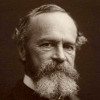“ In heroism, we feel, life's supreme mystery is hidden. We tolerate no one who has no capacity whatever for it in any direction. On the other hand, no matter what a man's frailties otherwise may be, if he be willing to risk death, and still more if he suffer it heroically, in the service he has chosen, the fact consecrates him forever. ”
William James, The Varieties of Religious Experience (1902). copy citation
| Author | William James |
|---|---|
| Source | The Varieties of Religious Experience |
| Topic | heroism death |
| Date | 1902 |
| Language | English |
| Reference | |
| Note | |
| Weblink | http://www.gutenberg.org/files/621/621-h/621-h.html |
Context
“Phrases of neatness, cosiness, and comfort can never be an answer to the sphinx's riddle.
In these remarks I am leaning only upon mankind's common instinct for reality, which in point of fact has always held the world to be essentially a theatre for heroism. In heroism, we feel, life's supreme mystery is hidden. We tolerate no one who has no capacity whatever for it in any direction. On the other hand, no matter what a man's frailties otherwise may be, if he be willing to risk death, and still more if he suffer it heroically, in the service he has chosen, the fact consecrates him forever. Inferior to ourselves in this or that way, if yet we cling to life, and he is able “to fling it away like a flower” as caring nothing for it, we account him in the deepest way our born superior. Each of us in his own person feels that a high-hearted indifference to life would expiate all his shortcomings.”
source



